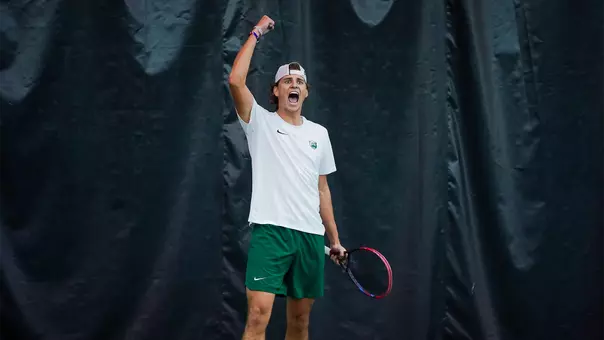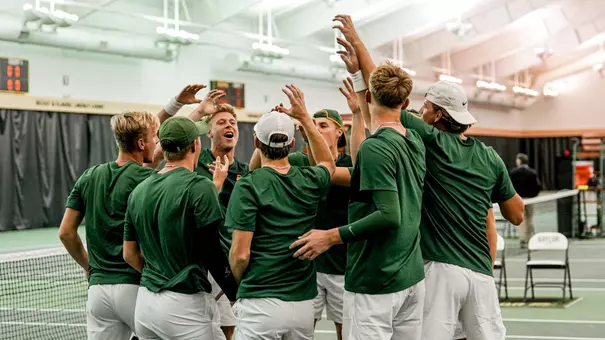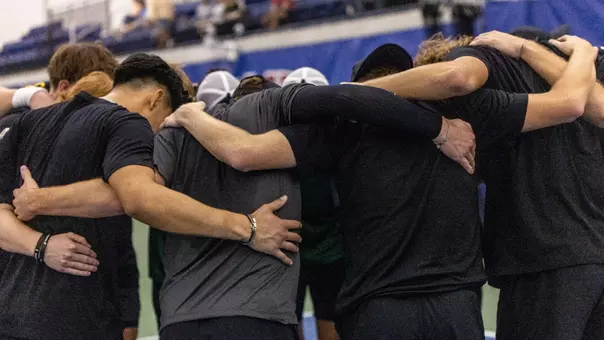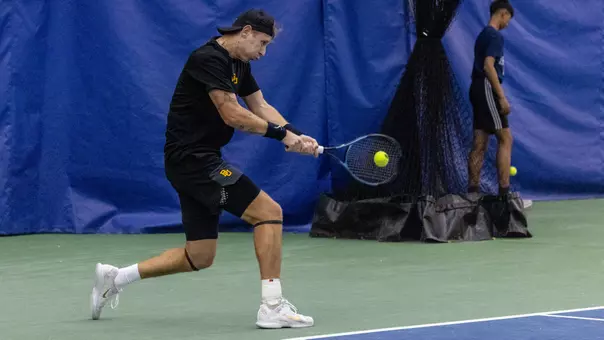Knoll Built Champion From Ground Floor
11/6/2008 12:00:00 AM | Men's Tennis
Nov. 6, 2008
By JERRY HILL
Baylor Bear Insider
(This is one of a series of articles on the 2008 induction class for the Baylor Athletic Hall of Fame)
After watching 30 minutes of his first practice at Baylor, coach Matt Knoll turned to assistant Kevin Kowalik and said, "Oh my gosh, what are we into here?"
"We just didn't have any guys who could play tennis at a very good level," Knoll said. "We had three guys that hung on and did OK (James Matthew, Jaro Turek and Pevin Waas). And we had a couple other guys that had a little bit of ability. Then we had six or seven guys that were average high school players, that weren't Division I athletes and were overmatched."
But even with those humble beginnings, Knoll believed he could build a national championship team. That's why he left a top-20 program at Kansas in 1996 to take over a Baylor program that had won just one Southwest Conference match in the previous eight seasons.
Baylor had the advantage of location, within a two-hour drive from four nationally ranked programs; a fertile recruiting ground in Texas with some of the top players in the country; and a private school atmosphere that would attract players who want to be in that kind of academic environment.
"And then as much as anything, I believed Tom Stanton and Robert Sloan when they told me they wanted to be good," said Knoll, part of a 2008 Baylor Athletic Hall of Fame class that will be honored during Friday's induction banquet. "I probably shouldn't have. There was no real good reason to believe them. But I sat across the table from them and looked at their eyes and heard what they had to say and bought what they were selling. And it turned out they were honest. They did want to be committed to tennis. They did want to build a facility."
Knoll's vision came to fruition eight years later, when the 2004 Bears went 32-2 and wiped out UCLA, 4-0, to win the school's first national championship in any sport.
"That team was unbelievable in doubles," Knoll said. "(Benedikt) Dorsch was way better than everybody else in the country at 1. (Benjamin) Becker was too good for everybody at his spot. (Ivor) Lovrak was too good for everybody at 6. And Reiner (Neurohr) was playing the best tennis of his career."
With Matias Marin and Matija Zgaga in the middle of the lineup, the Bears lost just one individual match in a six-match run through the NCAA Tournament. After defeating Rice, 4-1, in the round of 16, they dominated Ohio State, USC and UCLA by identical 4-0 scores.
"We just peaked," Knoll said. "We played our best match in the history of the program in the national finals and beat UCLA in less than two hours. Just crushed them. The intensity level is pretty high at that time of year, so you're pretty focused and you're very much in the moment. So, no, you don't have the perspective, because you're really locked in. I think our whole team was locked in, and that's why we did so well."
Knoll's legacy, though, isn't built on just one championship. It's taking the Bears to the top of the mountain and then keeping them there.
A first "generation" led by Johann Jooste, Pawel Gajdzik, David Hodge and Mark Williams reached the quarterfinals for the first time in school history with a 4-2 upset of three-time defending national champion Stanford in '99.
And then Becker and Dorsch took the Bears to three consecutive semifinal appearances (2003-05), the '04 national championship and a runner-up finish in '05 with a 4-3 loss to UCLA.
"As you know, the best team doesn't always win," Knoll said. "As cliche as it sounds, if one guy wakes up with a stomach ache and one guy's girlfriend breaks up with him and one guy's failing four classes, all of a sudden you're not the best team in the country anymore. And you never know when you're going to find a team that catches the magic. UCLA had four seniors. They won three matches in three sets. You have to give them a little credit. They did a heck of a job."
Instead of fading when Dorsch and Becker turned pro after the '05 season, the Bears have continued to flourish with semifinal appearances in 2006 and '07, a trip to the quarterfinals last year and a season-ending top-10 ranking for the seventh consecutive year.
"To make the semifinals five times in a row was really satisfying," Knoll said. "Because you heard it in recruiting a lot. `Dorsch and Becker are gone, and the golden era of Baylor tennis has come and gone.'
"The thing that's valid is that every generation of player is different. Dorsch and Becker were kind of their generation. And then I guess Lars (Poerschke) and (Michael) Kokta were a generation. And now we're in the Denes (Lukacs) and Dominik (Mueller) generation. It's satisfying to take several generations of players and still maintain a high level. At Georgia, they had the John Isner generation. And, boy, that was good. But now what?"
The same thing could be asked of Knoll, who has a 12-year record of 286-70 while winning eight Big 12 Conference regular-season championships and six Big 12 Tournament titles while making 11 consecutive NCAA Tournament appearances.
Where does the Baylor program go now after losing Poerschke, a three-time All-American? And having won one national championship, can the Bears win another?
"Absolutely," Knoll said. "I don't know that we're the best team right now. If you put everything on the grease board, UCLA's better than everybody else right now. But nobody's played. And we're not going to play on the grease board. There's a couple other teams. Stanford's got unbelievable talent. And then you've got Texas, USC, Ohio State that, on paper, look better than us.
"But I think we've got to be in that conversation somewhere. That's where we've been. We've been in the group. And now we've got to improve and be ready to play our best tennis in the end."
Knoll is joined in this year's Hall of Fame class by former football standout Ray Crockett, baseball's Marty Crawford, cross country runner Sally Geis Smart, track and field's Roy Lee Smalley and basketball's Tom Stanton.
"When you look at the people in there, I'm certainly honored to even be considered and selected," said Knoll, who resides in Waco with his wife, Greta, and twin sons, Erik and Karch. "To be a part of a group like that means a lot to me. But I'm 42 years old. I hope I have a lot of good stuff still in front of me."
NOTE: Features on the final two inductees will appear on baylorbears.com prior to Friday's 7 p.m. banquet.




















